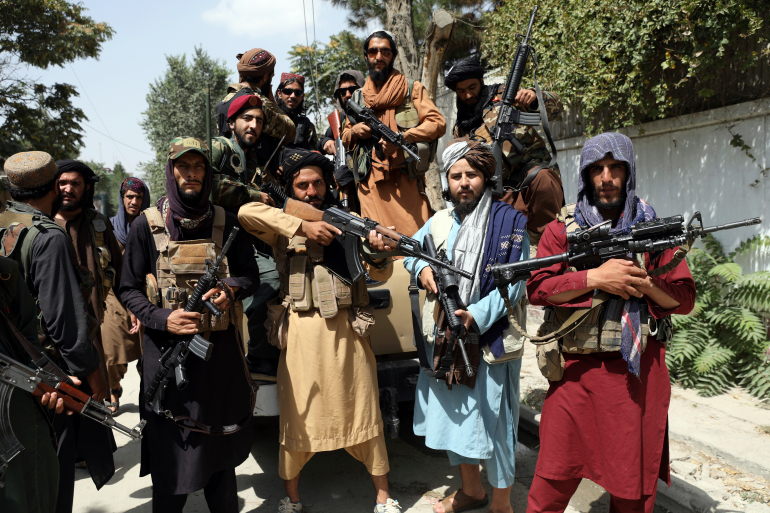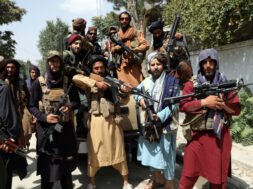
Taliban Change its Tone on Kashmir, Says “Has Right to Raise Voice for all Muslims Including in Kashmir”
Manas Dasgupta
NEW DELHI, Sept 3: In a sharp change in its tone and tenor, the Taliban, which earlier said it had no intention to interfere into the Kashmir affairs, on Friday said it had the “right to speak out in favour of Muslims anywhere in the world including Kashmir.
But as if to provide some relief to India, it said the Taliban did not have a policy of conducting “armed operations” against any country.
While the Taliban was set to announce the formation of the new government by late Friday, likely to be led one of its co-founder Mullah Baradar, and Mullah Hebatullah Akhundzada remaining its supreme spiritual leader, Suhail Shaheen, the Taliban spokesman for its political office in Doha, said it had the “right” to speak for all the Muslims in the world including in Kashmir, once again raising concern for India.
A senior Taliban leader earlier had assured India that it was keen to maintain friendly ties with India and had no interest in interfering in the Kashmir tangle being considered a bilateral issue between India and Pakistan. The Taliban was also said to have rejected a suggestion by some senior Pakistani ruling party leaders that it would help Pakistan to “liberate Kashmir.”
But on Friday, Suhail Shaheen said “We will raise our voice and say that Muslims are your own people, your own citizens and they are entitled to equal rights under your law.” As Muslims, it was the group’s right to speak out for Muslims living in Kashmir and any other country.
However, recalling the terms of the Doha agreement with the U.S., Shaheen added that the Taliban had “no policy of conducting armed operations against any country” raising concern of India that Afghan soil under the Taliban regime could be used for terrorist activities against it.
Shaheen’s remarks came days after the Ministry of External Affairs in New Delhi said Indian envoy to Qatar Deepak Mittal met Sher Mohammad Abbas Stanekzai, the head of the Taliban’s Political Office in Doha, at the request of the group. In the meeting, Mittal had conveyed to Stanekzai that Afghanistan’s soil should not be used for anti-Indian activities and terrorism.
It was the first publicly acknowledged formal diplomatic engagement that came two weeks after the Taliban seized control of Afghanistan. MEA Spokesperson Arindam Bagchi said at his weekly briefing on Thursday that India’s immediate focus in Afghanistan was to ensure that Afghan soil was not used for terrorist activities against it and it was still “very early days” to talk about any possible recognition to the Taliban.
On a question on Mittal’s meeting with Stanekzai, he said, “We used the opportunity to convey our concerns whether it is in getting people out [from Afghanistan] or on the issue of terrorism. We received a positive response.”
Mullah Baradar, who heads the Taliban’s political office, will be joined by Mullah Mohammad Yaqoob, the son of late Taliban founder Mullah Omar, and Sher Mohammad Abbas Stanekzai, in senior positions in the government, three sources said.
“All the top leaders have arrived in Kabul, where preparations are in final stages to announce the new government,” one Taliban official said.
Regarding the Haqqani Network, Shaheen said the propaganda against the Haqqanis was based on mere claims. He said Haqqani is not a group but they are part of the Islamic Emirate of Afghanistan. “They are the Islamic Emirate of Afghanistan,” he added.
His remarks came as after Al-Qaeda through its Al-Sahab media asked the Muslim community to “free” other Muslim lands after the liberation of Afghanistan, putting Kashmir on the list of targets of jihad. Besides Kashmir, it shortlisted the Levant, comprising Iraq, Syria, Jordan and Lebanon; Maghreb, or the region in northwest Africa consisting of Libya, Morocco, Algeria, Mauritania, Tunisia and Somalia; and Yemen on its priorities.
The world is united in what they expect the Taliban to do to get recognition in Afghanistan from the international community, the White House said noting that it was for China to decide where it would like to stand on the situation.
“The world is united in what they expect the Taliban to do, which is allow people who want to depart the country to depart. And China has to decide where they are in that effort,” White House Press Secretary Jen Psaki told reporters at her daily news conference.
Even as Afghanistan’s economy has reached the brink of collapse, the United States said it had no plans to release billions in Afghan gold, investments and foreign currency reserves parked in the US which it froze after the Taliban’s takeover, despite pressure from humanitarian groups and others who say the cost may be the collapse of Afghanistan’s economy.
Much of the Afghan central bank’s $10 billion in assets are parked overseas, where they are considered a key instrument for the West to pressure the Taliban to respect women’s rights and the rule of law.
Any unfreezing of these assets may be months away, financial experts said. The US stand was announced as Afghanistan’s economy is battling the ramifications of an ongoing drought and the conflict that has killed an estimated 240,000 Afghans. After ruling the country from 1996 to 2001, by forcing the radical implementation of the Sharia Law, the militant group has promised a relatively flexible way of rule this time.
Qatar is working with the Taliban to reopen Kabul’s airport as soon as possible, its Foreign Minister said urging the hardline Islamists to allow Afghans to leave. The airport, the scene of a frenzied evacuation which ended with the U.S. troop withdrawal on August 31 is out of operation with much of its infrastructure degraded or destroyed.
“We are working very hard [and] we remain hopeful that we will be able to operate it as soon as possible,” said Qatari Foreign Minister Sheikh Mohammed bin Abdulrahman al-Thani.
“Hopefully in the next few days we will hear some good news,” he told a news conference in Doha. A Qatari technical team flew into Kabul on Wednesday to discuss reopening the airport, the first plane to land there since the evacuations. A source with knowledge of the matter said the goal was to resume flights both for humanitarian aid and to provide freedom of movement, including the resumption of evacuation efforts.
The United Nations said its Humanitarian Air Service was resuming air operations in Afghanistan to enable 160 aid organisations to continue activities in the country’s provinces.
The United Nations spokesman Stephane Dujarric said on Friday that the air passenger service, operated by the Rome-based UN World Food Program, was linking the Pakistani capital of Islamabad with Mazar-i-Sharif in the north and Kandahar in the southeast.
He said the food programme reports that three flights already have taken place to Mazar-i-Sharif since August 29 and that efforts are being made to step up those operations as soon as possible.
Pakistan is urging the international community to adopt a three-pronged approach to Afghanistan following the Taliban takeover: quickly deliver aid to 14 million people facing a hunger crisis, promote an inclusive government, and work with the Taliban to attack all terrorist groups in the country.
Pakistan’s ambassador to the United Nations, Munir Akram, laid out his government’s vision for a future international role in Afghanistan saying Pakistan has been in contact with regional countries and the broader global community on working together on the three priorities.
Meanwhile, a few dozen protesters have gathered outside the presidential palace in Kabul, urging the country’s new Taliban leadership to uphold women’s rights achieved under Western patronage and include women in the upcoming government.
At one gate on Friday, around a dozen women held up small printed pages urging for “A heroic Cabinet with the presence of women.” The protestors chanted slogans asserting human rights and saying they did not want to return to the past.
A document circulated by protesters demanded that Afghan women are granted full rights to education, social and political contributions in the country’s future, and general freedoms including that of free speech.
Afghanistan’s most popular private television network has voluntarily replaced its risque Turkish soap operas and music shows with tamer programs tailored to the country’s new Taliban rulers, who have issued vague directives that media must not contradict Islamic laws or harm the national interest.
Still, independent Afghan news stations are keeping female presenters on the air and testing the limits of media freedom under the group, whose militants have killed journalists in the past but have promised an open, inclusive system since coming to power in August.
But while the Taliban is preparing the formation of the new government, the Taliban forces and fighters loyal to local leader Ahmad Massoud battled in Afghanistan’s Panjshir Valley on Thursday, more than two weeks after the Islamist militia seized power. Panjshir is the last province resisting rule by the Taliban, who retook control of the country as U.S. and foreign troops withdrew. Each side said it had inflicted heavy casualties. “We started operations after negotiation with the local armed group failed,” Taliban spokesman Zabihullah Mujahid said. Taliban fighters had entered Panjshir and taken control of some territory, he said.













